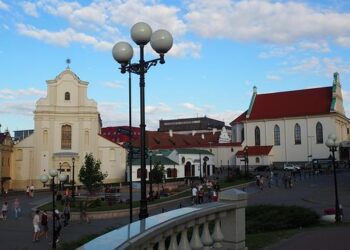Lukashenko Secures Controversial Seventh Term Amid Global Backlash
In a tense and charged environment, Alexander Lukashenko, the President of Belarus, has officially been sworn in for a disputed seventh term. The ceremony took place in Minsk and was marked by increased security measures alongside notable political unrest. In his address to critics,Lukashenko’s tone was notably defiant as he asserted that they “have no future,” highlighting the ongoing suppression of dissent and civil liberties under his administration. The legitimacy of the electoral process has faced widespread scrutiny both within Belarus and from international observers following months of protests against what many perceive as an authoritarian regime.
The political dynamics in Belarus are influenced by several key elements:
- Suppression of Opposition: The government has systematically targeted opposition factions, leading to numerous arrests and strict media censorship.
- Economic Struggles: Continuous sanctions imposed by Western nations have intensified economic hardships; still, the regime persists amid serious allegations of human rights violations.
- Civic Sentiment: While some citizens may quietly support the government, there is an increasing sense of frustration among those yearning for democratic freedoms.
| Event | Date |
|---|---|
| Last Presidential Election | August 9, 2020 |
| Began Major Protest Movement | Around August 2020 |
| Diplomatic Sanctions Imposed | September 2020 |
The Effects of Authoritarianism on Belarusian Society and International Relations
The recent inauguration carries profound implications not only for governance within Belarus but also for its societal fabric and global relations. In an environment rife with repression , censorship ,and fear , civic engagement has significantly declined.Many citizens feel disillusioned about their future prospects under such stringent governmental control over media narratives that suppress dissenting opinions. This pervasive climate fosters apathy among the populace while diminishing hope for any considerable democratic reform.
The authoritarian governance style in Belarus has strained its relationships with Western nations resulting in heightened sanctions and diplomatic isolation . Both the European Union and United States have condemned human rights abuses perpetrated by Lukashenko’s administration which raises concerns regarding collective security in Eastern Europe. As ties between Belarus and Russia deepen further, these alliances could have significant ramifications on regional stability while neighboring countries remain wary about potential spillover effects from escalating authoritarianism.
Opposition Strategies: Overcoming Challenges in an Oppressive Climate
The swearing-in ceremony signifies yet another term filled with challenges for opposition groups striving against widespread discontent within society. These factions must develop effective strategies to navigate through this oppressive political climate where tactics range from severe censorship to violent crackdowns on dissenters‚ÄĒcreating perilous conditions for public expression.
In response to these challenges, opposition movements are adapting through innovative approaches:
- Global Advocacy: Forming alliances with foreign governments & international organizations aimed at raising awareness regarding human rights violations.
- Community Mobilization: Encouraging local communities towards civic engagement even amidst repression via safe channels like online organizing or small-scale demonstrations.
- Digital Resistance: Utilizing social media platforms effectively disseminate information counteracting state propaganda while employing encryption tools safeguarding activist identities.
Additonally ,the opposition must pivot towards more elegant methods sustaining their movements under duress. Crafting clear cohesive narratives resonating well amongst citizens can galvanize public support during uncertain times . Key strategies include :
- Targeted Messaging : Developing compelling stories illustrating consequences stemming from authoritarian rule alongside positive potentials associated democratic governance .
- Coalition Formation : Collaborating diverse groups unifying efforts showcasing broad-based resistance against current regime.
- Legal Action : Pursuing legal avenues contesting governmental actions promoting human rights aiming establish accountability frameworks.
Concluding Thoughts on Current Developments in Belarusian Politics  
To summarize , Alexander Lukashenko‚Äôs inauguration into yet another term highlights deepening divisions within Belarussian society along stark contrasts between ruling authorities & their critics . As he tightens grip power amidst rising dissent coupled global condemnation ,prospects surrounding genuine democratic reforms appear increasingly dimmed . His assertive declaration ‚Äúyou have no future‚ÄĚ serves not only warning directed opponents but also stark reminder facing civil society throughout country today . With keen eyes watching closely across international community , resilience exhibited by people fighting change remains pivotal shaping nation‚Äôs trajectory moving forward .
- Community Mobilization: Encouraging local communities towards civic engagement even amidst repression via safe channels like online organizing or small-scale demonstrations.
















